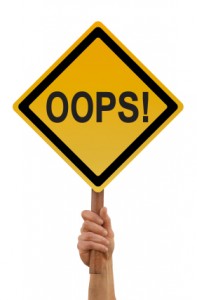 We’ve already written about the keys to building a winning sales organization, but in order to do that you need the right people on the team. In that post, I pointed out the importance of the “always be recruiting” mentality because you never know when you might need a new salesperson. And when the time does come to add someone to your sales team, it’s crucial that you not rush to fill the spot too quickly and make the wrong decision.
We’ve already written about the keys to building a winning sales organization, but in order to do that you need the right people on the team. In that post, I pointed out the importance of the “always be recruiting” mentality because you never know when you might need a new salesperson. And when the time does come to add someone to your sales team, it’s crucial that you not rush to fill the spot too quickly and make the wrong decision.
Since I’m always recruiting, I meet with a lot of sales candidates. Early morning coffee meetings are my favorite because it doesn’t interfere with my daily work routine, I rarely have to cancel because a client meeting comes up, and I can see if someone likes to get at it early in the day.
In my years of interviewing, I have noticed a few things that people do which just shock me – and destroy someone’s chances of getting hired. As a sales manager, it’s imperative to look at the interview process just like the sales process, only the candidate is pitching him or herself to you, not a product or service to a client. If you’re going to invest both time and money in someone, it’s important to have the right fit.
Here are the five things that I’ve seen kill a candidate’s chances of getting the job.
1. Being late without notice
There are few things that hurt someone’s chances more than showing up late, without notice. It means less—or no—time to interview, which is a disappointment for everyone. And if the candidate has a good reason for being late, which can certainly be reasonable, he or she should always let you know via a phone call, email or even a tweet! I truly don’t care if someone is late if they give me a heads up.
Pro Tip for Salespeople: My college golf coach said, “If you’re not going to be on time, be early.” That’s why I recommend planning to arrive 30 minutes before the interview. This will allot you time to deal with traffic, finding the building or parking spot and relax for a few in your car. These are all things you can control when you give yourself enough time. I’d also suggest walking in 10 minutes early. The receptionist will typically call the interview to let them know you’ve arrived, which gives you a chance to make a strong first impression – that you are punctual.
2. Not building rapport up front
Ever sit down for an interview with a candidate that just sits there and stares, waiting for you to take control? It’s never a good sign. Contrary to popular belief, not all good salespeople are extroverts, but they do know how to control a conversation, which is part of building instant rapport. This not only gets the conversation started, but keeps it rolling.
Pro Tip for Salespeople: Prepare ahead of time. Think specifically about what you’re going to say or ask as soon as you meet the interviewer. It doesn’t matter what the topic is, can be anything—the weather, your drive in, last night’s game, etc.—just be confident.
3. Questions lacking depth
Almost every candidate knows to ask some questions at an interview, but they don’t always know the difference between basic layup questions and good, deep questions. As an interviewer, you want to hear questions like: How did you start here? What motivates customers to want to buy from you? When someone doesn’t buy from you, why is that? Which lead sources are most effective? When you hire new salespeople that are quick to succeed, what do they do different? What about characteristics of those who don’t work out? Questions like these show you’ve thought about the position, and are not afraid to ask the tough questions.
Pro Tip for Sales People: Spend some time really considering what questions you want to ask. It’s just as important for you to decide if the company is a right fit for you as it is for the interviewer to decide if you’re a fit for the company. Don’t hesitate to ask the hard questions—they’ll get you farther than the easy ones.
4. Not asking for the next steps
Just like at the end of a sales meeting, the salesperson needs to understand or establish what the next course of action is. At the end of the interview, you want to hear the salesperson inquire as to what the next steps are. That’s why I recommend not volunteering your process—wait to see if the candidate seeks to know what’s ahead. If they don’t ask during an interview, they probably won’t in a sales meeting either.
Pro Tip for Salespeople: Always make sure to ask what you should expect following an interview. Do they think you’ll be a good fit? What strengths do they see in you? Where might you be lacking?
5. No follow-up
My office at my previous company was right next to our corporate recruiter and I recall that he noticed every hire he recently made had sent a handwritten thank you note. Every single one of them. And while I don’t think it has to be handwritten, there should be some kind of follow-up, and it should be the same day as the interview. It can be as simple as a thank you email with a reference to something discussed in the interview. A little goes a long way sometimes.
Pro Tip for Salespeople: In addition to the same-day thank you email, follow up with the hiring manager a week afterward. Treat it as if you were following up on a sales lead. Ask how the process is going, where things stand, and what you can do to get your name to the top of the list.
While these all may seem simple and obvious, they do not always happen. Call it basic blocking-and-tackling. There are plenty more “watch outs” but these things should never happen—ever. Remember that the way the candidate approaches the job interview is the same way they’ll approach the sales process with your clients.
My closing Pro Tip for Salespeople is this: Only about 2% of sales candidates do any of the aforementioned Pro Tips. If you do these, you’ll separate yourself from the pack, which will help you overcome obstacles during the hiring process. So, do you want to be in the top 2%?



